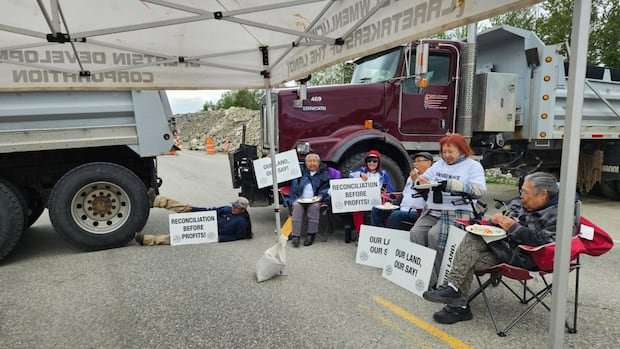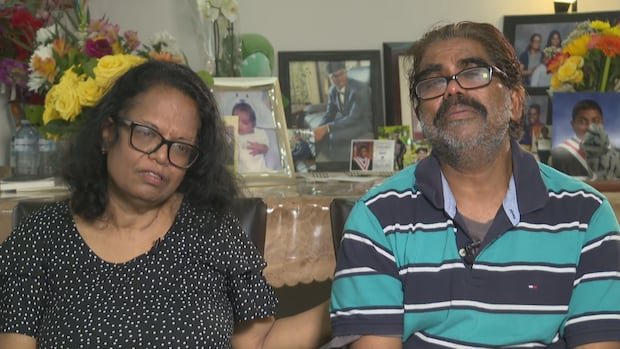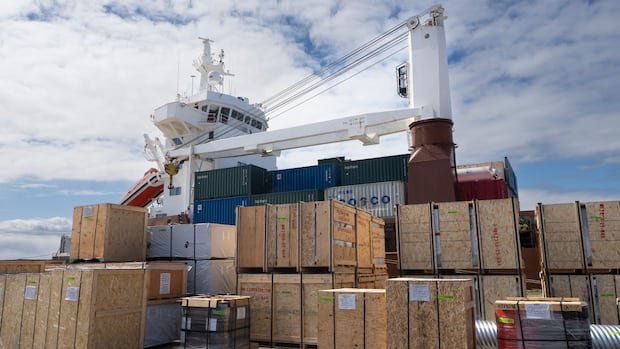A first nation inside BC is blocking access to the construction site of the RW Bruhn bridge in Sicamous, BC, on the alleged exclusion of its workers and businesses from the government -financed infrastructure project.
From 10 in the morning, on Monday, four Splatsin Development Corporation (SDC) dump trucks parked at both ends of the bridge, stopping the construction of the new four -lane replacement.
The action was initiated by Splatsin First Nation and SDC in response to what they describe as a pattern of broken agreements by Aecon Group Inc. and Emil Anderson Construction, the two companies hired to build the bridge.
“This is our only resource … to establish these blockages to get attention,” said Kukpi7 (the boss) Mike Christian, who also presides over the SDC Board.
“Our members can refer to many of them as impoverished. That’s why we are fighting, because every little economy [opportunity] aid “.
The bridge replacement project is being carried out by Aecon-Emil Anderson Construction General Partnership (AEGP), a 50-50 joint company offered by the $ 224 million project for the province of BC.
Despite being located in the SECWÉPEMC territory, SDC says that the community has been marginalized from a significant participation in the project.
“This was presented as a two -year opportunity. On the other hand, they have given us only three months of significant work,” said Grahame Go, CEO of SDC, in a statement on Monday. “What we have experienced in its place is corporate opportunism: exploit our association for its benefit and then put aside to reduce costs.”

Among the specific complaints are the elimination of an emergency medical vehicle operated by indigenous, the elimination of SDC trucks from the site despite a 50/50 transport agreement with the SDC and the frequent changes of last minute schedule that resulted in labor insecurity for indigenous equipment.
The nation also says that indigenous workers were sometimes sent arbitrarily home without explanation, and that the fuel purchase agreements that benefit indigenous suppliers were “undercut.”
Christian said that what the community wants is clear: “A signed agreement from the Ministry of Transportation or the two companies that will straighten this problem … adhere to the contract letter.”
He says that while this can cause some inconveniences to travelers, traffic is still allowed through a designated diversion route.
Province ‘working in close collaboration with all parties’
In a statement to CBC News, the Ministry of Transportation and Traffic said it is “aware of what is happening in the Bruhn Bridge project.”
“We recognize the deep cultural roots that Splatsin has to the area,” reads the statement. “We are working closely with all the parties to address the concerns that are raised and to solve the problems as quickly as possible.”
The Ministry added that it continues to monitor the situation and encouraged motorists to verify DRIVEBC updates.
Neither Aecon Group Inc. nor Emil Anderson Construction responded to the request for CBC comments at the deadline.
First Nation says it is a broader trend
In his statement, Splatsin said that the exclusion he is experiencing is not an isolated incident, but part of a broader trend of contractors that avoid obligations under the indigenous participation framework of BC.
The Indian Band of Neskonlith, also a Secwépemc community, issued a statement of support on Friday, saying that it shares Splatsin’s concerns and frustration about how the BC infrastructure benefits model (BCIB) has been implemented.
“These practices are not only discriminatory, but they represent a significant setback for the progress and prosperity of our people,” wrote Kukpi7 Irvin Wai of Neskonlith. “We are not asking for a special treatment … only for fair and transparent access to opportunities that affect our land and our people.”
Splatsin is asking the province to enforce its plan to implement indigenous opportunities and guarantee that the principles of reconciliation are maintained.
“This association was supposed to be about inclusion and shared opportunities,” Christian said in the statement. “Instead, it has become unilateral and disrespectful.”







